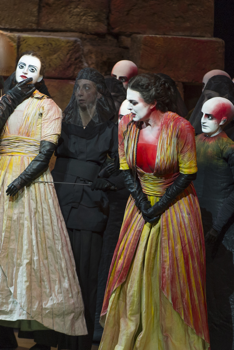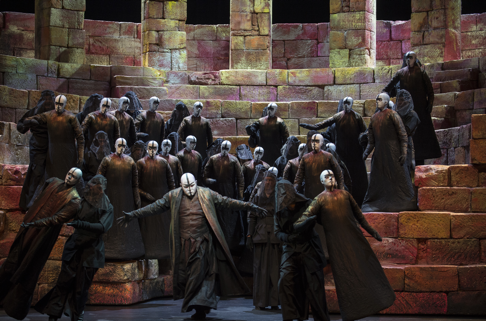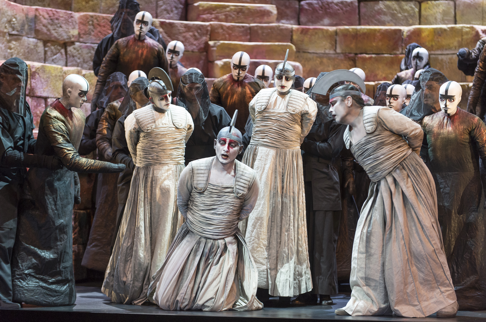
08 Feb 2015
Iphigénie en Tauride in Geneva
Hopefully this brilliant new production of Iphigénie en Tauride from the Grand Théâtre de Genève will find its way to the new world now that Gluck’s masterpiece has been introduced to American audiences.
English Touring Opera are delighted to announce a season of lyric monodramas to tour nationally from October to December. The season features music for solo singer and piano by Argento, Britten, Tippett and Shostakovich with a bold and inventive approach to making opera during social distancing.
This tenth of ten Live from London concerts was in fact a recorded live performance from California. It was no less enjoyable for that, and it was also uplifting to learn that this wasn’t in fact the ‘last’ LfL event that we will be able to enjoy, courtesy of VOCES8 and their fellow vocal ensembles (more below …).
Ever since Wigmore Hall announced their superb series of autumn concerts, all streamed live and available free of charge, I’d been looking forward to this song recital by Ian Bostridge and Imogen Cooper.
Although Stile Antico’s programme article for their Live from London recital introduced their selection from the many treasures of the English Renaissance in the context of the theological debates and upheavals of the Tudor and Elizabethan years, their performance was more evocative of private chamber music than of public liturgy.
Evidently, face masks don’t stifle appreciative “Bravo!”s. And, reducing audience numbers doesn’t lower the volume of such acclamations. For, the audience at Wigmore Hall gave soprano Elizabeth Llewellyn and pianist Simon Lepper a greatly deserved warm reception and hearty response following this lunchtime recital of late-Romantic song.
For this week’s Live from London vocal recital we moved from the home of VOCES8, St Anne and St Agnes in the City of London, to Kings Place, where The Sixteen - who have been associate artists at the venue for some time - presented a programme of music and words bound together by the theme of ‘reflection’.
'Such is your divine Disposation that both you excellently understand, and royally entertaine the Exercise of Musicke.’
‘And there was war in heaven: Michael and his angels fought against the dragon; and the dragon fought and his angels, And prevailed not; neither was their place found any more in heaven … that old serpent … Satan, which deceiveth the whole world: he was cast out into the earth, and his angels were cast out with him.’
There was never any doubt that the fifth of the twelve Met Stars Live in Concert broadcasts was going to be a palpably intense and vivid event, as well as a musically stunning and theatrically enervating experience.
‘Love’ was the theme for this Live from London performance by Apollo5. Given the complexity and diversity of that human emotion, and Apollo5’s reputation for versatility and diverse repertoire, ranging from Renaissance choral music to jazz, from contemporary classical works to popular song, it was no surprise that their programme spanned 500 years and several musical styles.
The Academy of St Martin in the Fields have titled their autumn series of eight concerts - which are taking place at 5pm and 7.30pm on two Saturdays each month at their home venue in Trafalgar Square, and being filmed for streaming the following Thursday - ‘re:connect’.
The London Symphony Orchestra opened their Autumn 2020 season with a homage to Oliver Knussen, who died at the age of 66 in July 2018. The programme traced a national musical lineage through the twentieth century, from Britten to Knussen, on to Mark-Anthony Turnage, and entwining the LSO and Rattle too.
With the Live from London digital vocal festival entering the second half of the series, the festival’s host, VOCES8, returned to their home at St Annes and St Agnes in the City of London to present a sequence of ‘Choral Dances’ - vocal music inspired by dance, embracing diverse genres from the Renaissance madrigal to swing jazz.
Just a few unison string wriggles from the opening of Mozart’s overture to Le nozze di Figaro are enough to make any opera-lover perch on the edge of their seat, in excited anticipation of the drama in music to come, so there could be no other curtain-raiser for this Gala Concert at the Royal Opera House, the latest instalment from ‘their House’ to ‘our houses’.
"Before the ending of the day, creator of all things, we pray that, with your accustomed mercy, you may watch over us."
The doors at The Metropolitan Opera will not open to live audiences until 2021 at the earliest, and the likelihood of normal operatic life resuming in cities around the world looks but a distant dream at present. But, while we may not be invited from our homes into the opera house for some time yet, with its free daily screenings of past productions and its pay-per-view Met Stars Live in Concert series, the Met continues to bring opera into our homes.
Music-making at this year’s Grange Festival Opera may have fallen silent in June and July, but the country house and extensive grounds of The Grange provided an ideal setting for a weekend of twelve specially conceived ‘promenade’ performances encompassing music and dance.
There’s a “slide of harmony” and “all the bones leave your body at that moment and you collapse to the floor, it’s so extraordinary.”
“Music for a while, shall all your cares beguile.”
The hum of bees rising from myriad scented blooms; gentle strains of birdsong; the cheerful chatter of picnickers beside a still lake; decorous thwacks of leather on willow; song and music floating through the warm evening air.

Hopefully this brilliant new production of Iphigénie en Tauride from the Grand Théâtre de Genève will find its way to the new world now that Gluck’s masterpiece has been introduced to American audiences.
(The Metropolitan and Seattle operas production directed by Stephen Wadsworth made it to Live in HD in 2011, and Robert Carsen’s 2006/2007 production was seen in San Francisco and Chicago.)
Gluck’s 1779 opera is a strange work, its libretto based on the 1757 tragedy of the same name by Claude Guimond de la Touche who had lifted entire sections of his play from earlier opera librettos based on Euripides’ tragedy Iphigenia in Taurus. La Touche was a Jesuit for 14 years, but left the order to be a full-time poet.
Gluck’s French operas are through-composed solemn events, well respected in the troubled times that lead to the French revolution. But Gretry’s comic operas of the same moment with spoken dialogues and pretty airs were far more pleasurable to audiences. Maybe some of Gretry’s easy sentimentality made its way into Gluck’s tragedy in the questionable relationship between Oreste and his companion Pylade. The 1997 Glimmerglass production simply made them lovers.
If the Carsen production was dismissed as euro-trash by a critic on Resmusica* (blood covered walls, all actors in black tunics), and the Wadsworth production according to the critic on The Classical Review seemed fearful that its audience might be bored (hyper-ventilating ballets) the new Geneva production hits the nerve center of the opera by listening to the music. The production hears its solemnity, participates in its individual dramas, and illustrates its pantomimes — there is not a single second when the stage action departs from the absolute directness of the storytelling. The Gluck genius was to make music drama, and it was pure in Geneva.
 Alexey Tikhomirov as Thoas and male chorus puppets
Alexey Tikhomirov as Thoas and male chorus puppets
Gluck’s rediscovered tragic unities are relentlessly upheld in this production staged by German born, culturally French informed stage director Lukas Hemleb and Berlin born, European and American formed sculptor Alexander Polzin. There was no ballet. Instead every principal actor had his double. A life-size puppet. Every blacked-out chorister, forty of them, held his life-size, black puppet. The set, astounding in scope, was a heavy Greek theater made of huge cut stones. It too had its double, an equal construction that had been yanked from the earth, suspended above the stage for the final scenes of the opera.
The concept was to step back from action, to allow the actors react to the story and to themselves as the story unfolded. Body movement was abstractly linear, the movement of mechanically motivated limbs. The results were constructions of motion that mirrored the brutal melodic lines of this morbid tale, and the abruptness of harmonic and theatrical structure, The actors were the music, and it was always a theater, theater itself, that we saw, and felt, from within and from without.
For the third act there was no set, only a bowl in the middle of the stage into which plummeted bits of the presumed dead Oreste. Oreste was Italian baritone Bruno Taddia who in the second act had fallen away from his puppet double onto the forestage to deliver, alone, his agonized recitative “Dieux protecteurs de ces affreux rivages!” In the emotional immediacy, rare in Gluck, of this outburst he became his puppet, moving in jerks and spasms as if operated by an exterior force. This force was Gluck’s music and the tragic muse.
 Bruno Taddia as Oreste, Steve Davislim as Pylade, their puppet doubles
Bruno Taddia as Oreste, Steve Davislim as Pylade, their puppet doubles
Mr. Taddia gave an over-the-top performance in warm, secure voice. His extreme performance was matched to a much lesser degree by the Iphigénie of Italian soprano Anna Caterina Antonacci (remember that this was a Maria Callas role so the stakes are already impossibly high). Her physical involvement was gratefully more measured (much more) than that of Mr. Taddia, her voice securely if not easily or opulently carved Gluck’s emotional recitative “Je cede à vos désirs” and air “D’une image, hélas, trop chérie!”
Oreste’s companion Pylade was sung by Australian tenor Steve Davislim. At the final performance, perhaps exhausted from the run of six performances this fine artist was unable to take his air “Divinité des grandes âmes” to its melodic heights, though it was otherwise sung in beautiful voice. Pylade, unlike Oreste and Iphégenie is tormented only by human love (for Oreste), and not by divine forces.
As the tyrant king Thoas bass Alexey Tikhomirov threatened appropriately if without distinction compared to the powerful performances of Iphigénie, Oreste and Pylade.
The proceedings were presided over by Dresden born conductor Hartmut Haenchen, who magnificently managed the score, integrating its orchestral, choral, balletic and solo voices into the tragedia messa in musica that Gluck imagined. It must be said that one did not hear the orchestra separately from seeing the stage. Gesamtkunstwerk indeed.
Michael Milenski
*"Euro-trash" was the term used by Resmusica, a French language website.
Casts and production information:
Iphigénie: Anna Caterina Antonacci; Oreste: Bruno Taddia; Pylade: Steve Davislim; Thoas: Alexey Tikhomirov; Diane: Julienne Walker; Un Scythe: Michel de Souza; 1ère Prêtresse: Mi-Young Kim; 2ème Prêtresse: Marianne Dellacasagrande; Une femme grecque: Cristiana Presutti; Le Ministre du sanctuaire: Wolfgang Barta. Chœur du Grand Théâtre de Genève, Orchestre de la Suisse Romande. Conductor: Hartmut Haenchen;
Mise en scène: Lukas Hemleb; Décors: Alexander Polzin; Costumes: Andrea Schmidt-Futterer; Lumières: Marion Hewlett; Collaboration chorégraphique: Joanna O’Keeffe. Grand Théâtre de Genève, February 4, 2015.